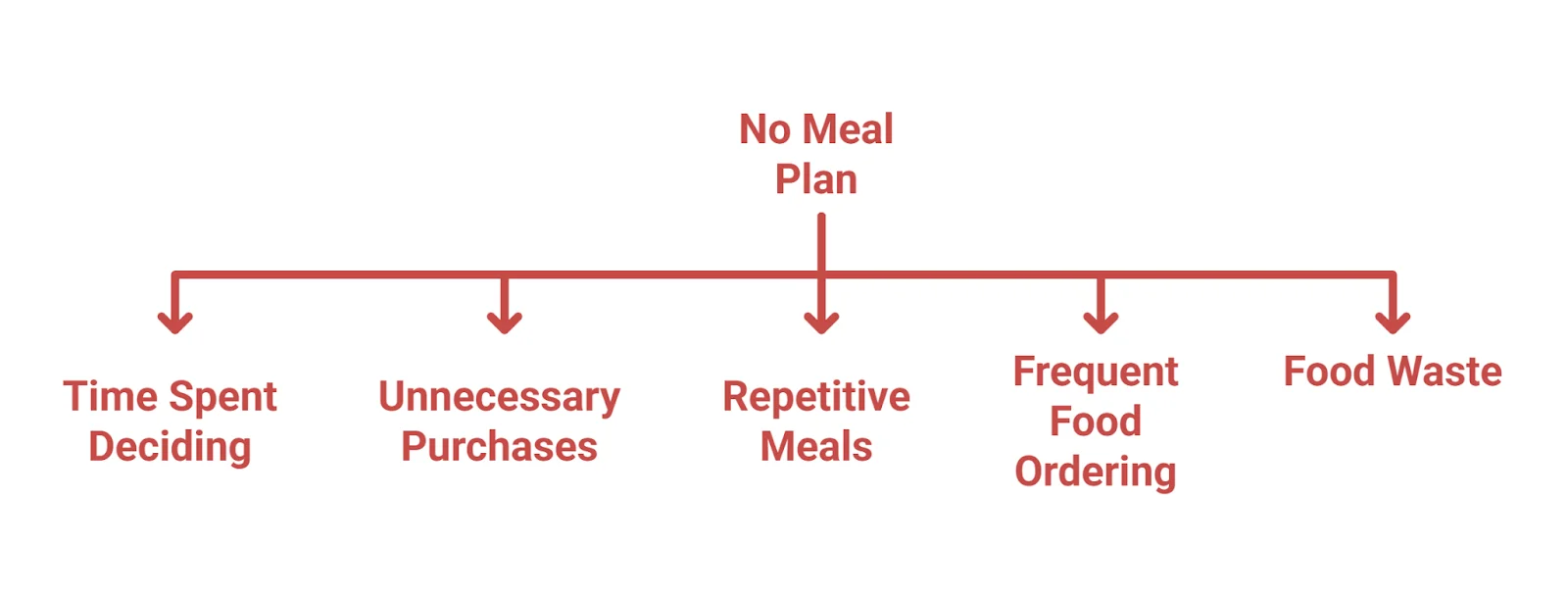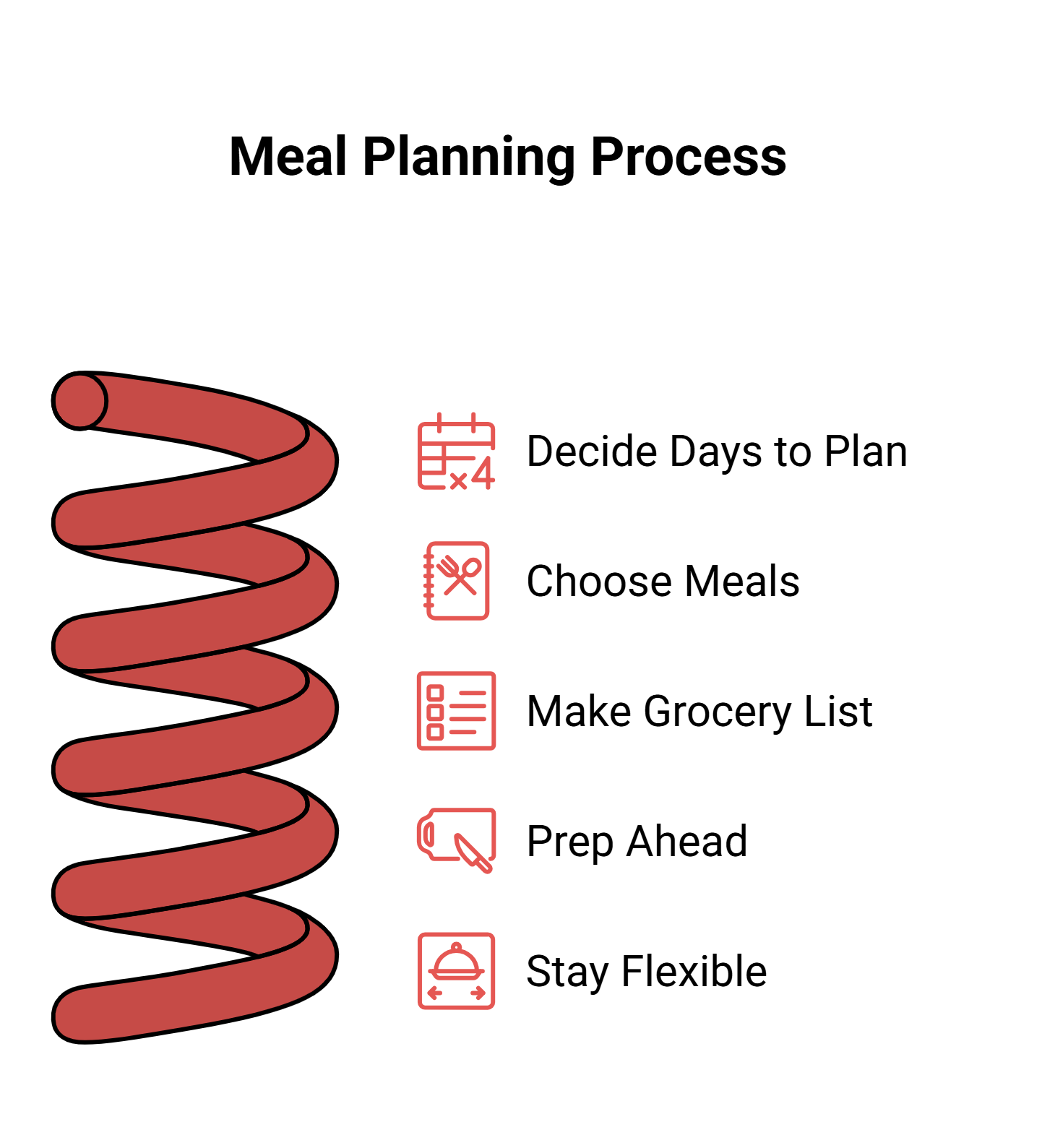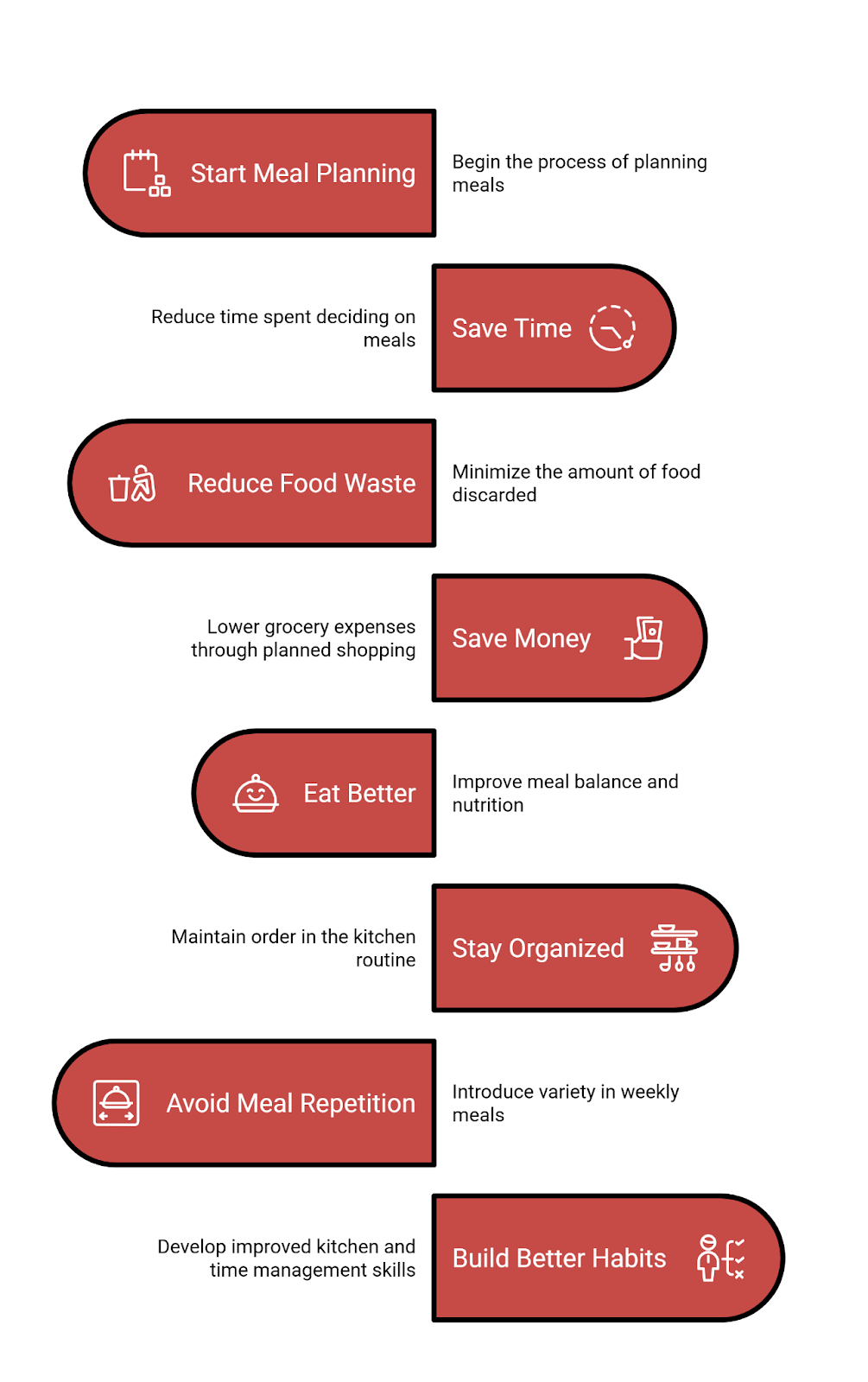
Best Meal Planner for Healthy Eating | Plan Smart Eat Better
2025-07-09
Meal planner makes weekly cooking easier by helping you decide what to eat, save time, and reduce food waste. You'll learn how to stay organized in the kitchen, shop smarter, avoid last-minute food decisions, and prepare balanced meals without stress. It’s the easiest way to enjoy home-cooked food and build better eating habits every week.
Introduction:
Meal planning is a simple way to organize your food for the week. It helps you decide what to cook, what ingredients to buy, and how to use your time better in the kitchen. Many people think meal planning takes too much effort, but it actually makes cooking easier and faster.
When you plan your meals, you don’t waste food. You don’t spend extra money on takeout. You don’t have to guess what to eat every day. You already know.
This blog will explain how a meal planner works, who should use one, and how it can help you cook more balanced, home-cooked meals with less stress.
You’ll also learn about smart tools like recipe organizers and how they keep your favorite meals saved in one place, so you don’t need to search for ideas every time.
If you’re new to meal planning or just want to make it simpler, this guide will show you exactly how to start with real steps.
Common Problems People Face Without a Meal Plan
Most people don’t realize how much time and money they lose by not planning their meals. They make food decisions at the last minute, shop without a list, and forget what’s already in the fridge. These small problems build up over time.
Here are some real challenges people face when they don’t use a meal planner:

1. Too Much Time Spent Deciding What to Cook
You stand in the kitchen, open the fridge, and still don’t know what to make. This happens almost every day. It might take 20–30 minutes just to decide on one meal. That’s hours wasted every week.
2. Buying Things You Don’t Need
Without a clear plan, you walk through the store and pick random items. Some you already had at home. Others you won’t use in time. This leads to cluttered shelves and food waste.
3. Cooking the Same Meals Again and Again
When you don’t plan, you often repeat the same meals. Maybe it's quick pasta or frozen food. Over time, eating becomes boring, and your meals lack balance.
4. Ordering Food Too Often
When there’s no meal ready and no ingredients prepped, the easy option is ordering food. This can be expensive and unhealthy, especially if it happens several times a week.
5. Wasting Food in the Fridge
Fresh vegetables go bad. Leftover rice is thrown out. That extra pack of yogurt expires. Why? Because meals weren’t planned around what you already had.
How a Meal Planner Actually Works (Step-by-Step)
A meal planner is not a strict rulebook. It’s a helpful system that gives your meals some structure. It helps you plan ahead so that cooking doesn’t feel like a daily puzzle.
Here’s how it works in real life step by step.

Step 1: Decide Which Days You Want to Plan For
You don’t need to plan every single meal of the week. Start small. Pick three to five days. You can focus only on dinners, or just weekdays if weekends are less busy.
The goal is to reduce guesswork, not to make your life harder. Some people plan just five dinners. Others include lunch and breakfast. Choose what works for you.
Step 2: Choose the Meals You Want to Cook
Once you know your days, think about what you want to eat. You can pick recipes you already love or try something new. This is where planning gets fun.
It helps to check what’s already in your kitchen. Do you have rice, pasta, or leftover vegetables? Use them first. This saves money and prevents food waste.
Write down your meal ideas for each day. Try to mix things, maybe a rice bowl one day, pasta the next, and something quick on your busiest day.
Step 3: Make a Grocery List Based on Your Plan
After your meals are decided, note down all the ingredients you’ll need. Go through each recipe and list what’s missing from your kitchen.
This step helps you avoid multiple grocery runs. You’ll buy only what’s needed and nothing extra. It also helps cut down impulse buying.
Some people like to group their list by category: vegetables, grains, dairy, etc. This makes shopping faster.
Step 4: Do Some Prep Ahead (If You Can)
You don’t need to cook everything in one day. But doing a little prep can save time. You can chop vegetables, wash greens, soak beans, or marinate meat.
Even 30 minutes of prep can make your weekday cooking faster and less stressful.
Step 5: Stay Flexible and Adjust As Needed
Meal planning isn’t strict. Life changes, plans come up, and cravings happen. You can always switch Tuesday’s meal with Thursday’s.
It’s okay to change things. A meal planner gives you direction, not pressure. The goal is to feel organized, not boxed in.
Benefits of Using a Meal Planner
Many people think meal planning is hard or takes too much time. But the truth is, once you start using a meal planner, daily cooking becomes much easier. You save time, waste less food, and feel more in control of your meals.
Here are some real benefits you get when you use a meal planner in your weekly routine:

1. You Save Time Every Day
When meals are already planned, you don’t waste time deciding what to cook. You know what’s for dinner before the day even starts. This helps you cook faster and stay relaxed during busy hours.
2. You Waste Less Food
When you plan your meals, you only buy the ingredients you need. This means fewer items go bad in the fridge. You use what you have, and nothing is forgotten in the back of a shelf.
3. You Spend Less Money on Groceries
Without a plan, people often buy random things at the store. With a meal planner, you shop with a clear list. This helps you avoid buying extra items you won’t use. It also helps you skip expensive takeout meals.
4. You Eat Better Without Extra Effort
Planning helps you choose meals that are more balanced. You can mix vegetables, proteins, and grains properly. Even if you’re not following a special diet, a meal plan makes it easier to eat better without stress.
5. You Stay Organized in the Kitchen
Meal planning brings more order to your routine. You know what ingredients are in stock, which meals are coming up, and what needs to be prepped. Cooking feels more calm and less rushed.
6. You Don’t Repeat the Same Meals All Week
When you plan your food in advance, you can try different recipes throughout the week. It stops you from eating the same thing again and again. It also makes meals more enjoyable.
7. It Helps You Build Better Habits
Using a meal planner regularly teaches you how to manage your kitchen, food, and time better. You become more aware of what you eat and how you cook.
Real-Life Improvements You’ll Notice with Meal Planning
Meal planning may sound like a small change, but once you start doing it, your daily routine gets easier. You don’t need to plan every meal perfectly. Even basic planning helps with cooking, shopping, and eating better without stress.
Here are some small, real changes that many people notice after using a meal planner:
You don’t waste time deciding what to cook
One of the biggest problems people face every day is not knowing what to make. They stand in the kitchen thinking for 15–20 minutes, then cook something random or order food. When you plan your meals ahead, that decision is already made. You know what you’re going to cook, and you can start right away.
Grocery shopping becomes easier
When meals are planned, your shopping list becomes short and clear. You only write down what you need. You don’t buy extra things that may go to waste. It also saves time at the store—you walk in with a list, pick what’s needed, and leave. No guessing.
You stop wasting food in the fridge
Without a plan, we often forget what’s in the fridge. Vegetables go bad. Leftovers sit too long. But when you plan meals based on what’s already in your kitchen, you use more of what you already have. This reduces waste and saves money too.
You don’t spend too much on food
Many people overspend on groceries because they shop without a plan. Others spend extra money on takeout meals when they don’t feel like cooking. With a meal planner, you cook at home more often and spend less on food you don’t need.
Your meals become more balanced
It’s easier to make healthier choices when you can see your full week of meals. You can include vegetables, proteins, and grains in the right way. Planning helps you avoid eating the same thing every day. Even if you’re not on a special diet, your meals naturally become better.
You feel more organized each week
Meal planning gives you more control over your time. You don’t feel rushed or confused when it’s time to cook. With a small amount of planning, your week feels more steady and relaxed. Cooking becomes easier to manage, even with a busy schedule.
Planning feels easier with tools like Foodsie’s MEAL PLANNER
If you don’t want to use paper or notebooks, digital tools can help. A simple app like Foodsie’s meal planner lets you pick meals, save recipes, and make your grocery list in one place. It helps you stay organized without extra effort.
Conclusion
Meal planning isn’t about rigid routines or perfect diets—it’s about giving yourself a little structure and peace around food. When you decide meals ahead, you save time, money, and stress. You stop wasting food and cook a variety of meals without second-guessing yourself.
A tool like Foodsie’s meal planner can make things even smoother, but the true value comes from the habit itself. Start a small plan three meals a week, write a clear grocery list, and prep what you can ahead. Over time, you’ll notice your kitchen feels calmer, your wallet lighter, and mealtime easier.
Take one small step this week. Try planning even two dinners in advance. Watch how that simple change makes a big difference in how your day flows.
FAQs
1. How many meals should I plan in a week?
Start with 3 to 5 meals. You don’t need to plan all seven days. Focus on meals that are usually hard to manage like dinners on busy weekdays. As you get used to it, you can add more.
2. Is it okay to repeat meals during the week?
Yes, repeating meals is totally fine. If you like a recipe, make it twice a week. This saves time, money, and energy. Some people even plan one meal and eat it on two different days.
3. Can meal planning work for people with changing schedules?
Yes, it can. Just plan flexible meals. Pick recipes that don’t spoil fast and can be moved around if plans change. Meal planning is a guide not a strict rule.
4. Do I need to plan breakfast, lunch, and dinner?
Not at all. You can start by planning just dinners. Later, if you want, add lunches or breakfasts. Many people find success with planning only one meal per day.
5. How can I avoid wasting food when I'm planning my meals?
Always check your fridge before you plan. Use foods you already have. Choose meals that share ingredients for example, use spinach in two different recipes. Planning this way cuts waste.
6. What if I don’t like to cook every day?
Then plan to cook more on one day and store the food for later. You can prep two or three meals at once. This way, you eat home-cooked food without cooking daily.
7. How can Foodsie’s MEAL PLANNER help me stay on track?
It lets you choose meals, save your recipes, and get a ready-to-use grocery list. With everything in one place, you don’t need to guess or plan from scratch every week.